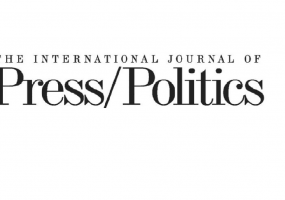What future for journalism?
04 Apr 2011
Rasmus Kleis Nielsen writes:
On March 28, RISJ Director David Levy delivered the opening presentation at an event on the future of journalism in front of a packed room of more than fifty journalists, media industry professionals, academics, and policymakers at Edelman, The Centre in Brussels. Presenting some of the main findings from our recent book The Changing Business of Journalism and its Implications for Democracy, edited by himself and Rasmus Kleis Nielsen, Levy argued that we need to move beyond the talk of one crisis facing journalism and take seriously the diversity of crises—different kinds of crisis, different crises facing different countries, and different degrees of crisis from country to country—and even question the assumption that journalism is indeed everywhere in crisis. Using figures from the book, he underlined that newspapers may have suffered greatly from the 2007-2009 recession especially in the US and the UK, but that the industry has held up well in much of continental Europe—even in countries with high levels of internet access and use—and is growing rapidly in emerging economies like Brazil and India. He pointed to the range of policy approaches being taken in different countries and suggested that there was a need to move beyond purely national frames in the search for solutions – something that Brussels policymakers were well placed to assist with. Reacting to his challenge that journalists, media managers, and policymakers need to break away from purely national debates and consider the variations that are characteristic of actual developments in the profession and industry across the world today, speakers from industry and trade associations, the European Parliament, and the European Commission opened up a lively debate on what mix of media business strategy and media policy can help the industry transition into a new communications environment. Angela Mills Wade from the European Publishers Association was the first to respond, and underlined that she too saw great potential for the industry—highlighting how newspapers are attracting rapidly growing and often very large audiences online—but also that the fundamental problem of developing sustainable business models for journalism on the internet remains unsolved. Wade insisted on the enduring relevance of professional journalism and commercial news organisations willing to invest in the work of reporters who bear witness to events such as we are seeing now in the Middle East, North Africa and Japan, and to dig in public affairs closer to home. She suggested that two areas that need reform were the role of public service media organisations making large amounts of content available for free online and on mobile platforms and a review of copyright protections to ensure that privacy and excessive aggregation under the cover of "fair use" doctrines does not undermine the industry. She put the central challenge clearly - "we need to get paid for our content." While far from entirely in opposition to Wade, it is no surprise that Marc Gruber from the International Federation of Journalists saw things somewhat differently. He insisted that the issues facing journalism—as a profession—had to be separated from the issues facing the media business—as an industry. He argued that while the industry, including newspapers, seems to be recovering quickly in many countries as the recession comes to an end, the profession is not—many journalists have lost their jobs, many more now work as freelancers under increasingly precarious conditions both at home and abroad, and without the organisational support that many could count on until recently. Gruber insisted that these issues have to be addressed, though he also underlined that he was sceptical of ideas of direct public subsidies for journalistic work, worrying both about maintaining journalistic independence and about issues of how recipients of support could be held accountable. One politician who has worked to advance the conversation is the Danish Member of the European Parliament Morten Løkkegaard (Venstre/ALDE), who recently served as rapporteur on a report about journalism and new media. In his comments Løkkegaard praised The Changing Business of Journalism and its Implications for Democracy and quoted from it that "the business of journalism is too important to leave to journalists and media managers" underlining that he—as a former journalist for both private newspapers and public broadcasters in his native Denmark—saw it as his role as a newly minted politician to push for measures to support independent quality journalism, especially at a European level. He mentioned the desire of the EP to support investigative journalism and how this had run into problems around ensuring independence and used recent controversies surrounding media legislation in Hungary to illustrate the importance of striking the right balance between a public role in a mixed media landscape, accountability of recipients of public support, and continued journalistic independence and professional integrity. He insisted that his own experience—as a political liberal and an experienced investigative journalist—did not convince him that there was a necessary incompatibility between public support and editorial autonomy. Adam Watson Brown from the European Commission made clear that he too thought the European Union should work with professional journalists, the media industry, and with member states to address the question of the future of the media, suggesting that a group would be established to discuss the issue and make sure that ideas and insights flowed freely between countries. The following discussion ranged widely, from differences and similarities between the media in the US and in Europe, over pay walls, tablets, and mobile phones as the tools with which a future for the news industry could be built, and to distinctions between legacy media and new entrants as recipients of subsidies. David Levy ended the discussion by reiterating the need to continue the conversation and the exchange of knowledge and ideas across national boundaries, to make sure that we can continually take stock of what is being done, how well it works, and evaluate whether what has been practiced in one place may or may not be applicable elsewhere. Effective decisions, both amongst journalistic professionals, media managers, and media policymakers must, he insisted, be based on better knowledge and comparative analysis of the problems at hand. Thus was the motivation behind the book, the event itself, and the ongoing work of the Reuters Institute.




